Voices cut through the darkness, chanting in prayer. A candle flickers centre-stage. These are potent symbols of the fundamentalism and fire that drive Handel’s Jephtha and of the battle between the darkness and the light which rages in this staging of Handel’s last oratorio by director Oliver Mears, set designer Simon Lima Holdsworth and lighting designer Fabiana Piccioli.
The biblical tale of an Old Testament hero who leads Israel to victory over a foreign oppressor has painful present-day resonance but this production has been a long time in the planning and Mears avoids any modern-day references, updating the action to the age of the Enlightenment – a time which sought a rational awakening, a radical break from a past dominated by religion and superstition, and which celebrated light as a symbol of knowledge and progress, over darkness which symbolised a backwardness, or decline, culminating in medievalism.
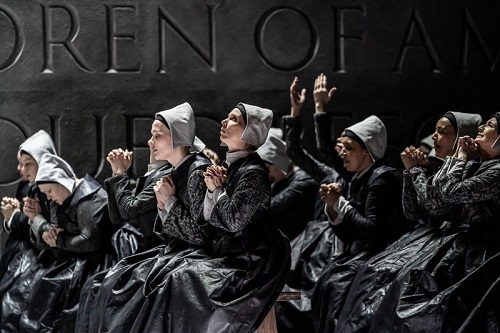
Handel’s Israelites are fundamentalist Puritans, costumed in severe grey plaid by Ilona Karas, their Ammonite oppressors the Georgian aristocracy, their coloured finery as riotous as their inebriated revelries. As in their recent production of Rigoletto, the directorial trio both use chiaroscuro to heighten the drama and create a graphic monumentalism through reference to the visual arts. Two towering stone tablets dominate the dark stage, their edifices inscribed with biblical text. These huge structures, influenced by the artwork of Richard Serra – which Holdsworth describes as combining ‘a monumentality and a minimalism’, an approach which conveys an almost ‘religious fervour’ – swivel with portentous slowness, to open up and close spaces, public and private. Sometimes they slide apart, affording a glimpse of the debauchery of the ‘Ammonites’, Hogarthian vignettes lit by a huge chandelier the crashing descent of which foreshadows a subsequent bonfire of the vanities.
Other visual influences include Fan Ho’s Approaching Shadow (1954) and William Blake’s frontispiece to his poem ‘Song of Los’, the latter evoked in a striking digital sequence in which the sun, an apocalyptic ball of fire before which Jephtha kneels, transforms into an eye, the black pupil looking down in judgement. “Hide thou thy hated beams, O sun, in clouds/ And darkness, deep as is a father’s woe; puritan austerity being the predominant feel,” sings Jephtha as he prepares to sacrifice his daughter to fulfil his rash, hubristic vow to the Almighty. The eye’s black pupil grows larger and larger until the fire is eclipsed and all is darkness.
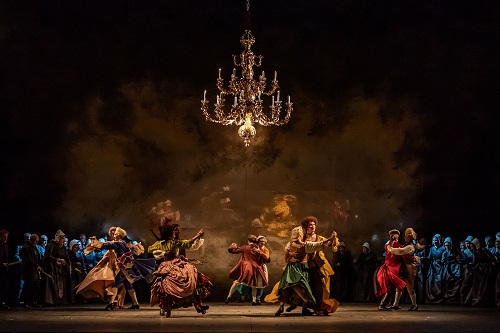
Handel’s oratorios were, obviously, not originally intended to be staged, but they have an innate dramatic pulse and operatic energy. There’s a danger, though, that the emphasis on static visual effects, for all their power in communicating both austerity and visionary yearning, can hinder the dramatic momentum, and that sometimes the case here. It’s exacerbated at times by the treatment of the chorus, a grey collective of religious fanatics whose fervent bible-waving, writhing in spiritual rapture, knife-brandishing and pyre-building – choreographed by Anna Morrissey – doesn’t always convince, and draws attention from the tragedy which is gradually embracing Jephtha’s family. It’s a tragedy which the chorus should be commenting on, not involved in.
The chorus are also often positioned towards the rear of the stage, in the shadows, which creates musical problems, too, as conductor Laurence Cummings struggles to achieve good ensemble, with chorus and orchestra – the latter not quite as precise as they might have been – frequently slightly out of kilter.
Thomas Morell’s libretto adapts of one of the most dramatic episodes in the Old Testament, in Judges XI, where Jephtha, an Israelite leader charged with freeing his people from their Ammonite oppressors, vows to his Lord that, if he is granted victory over his heathen enemies, he will sacrifice to the Almighty the first living thing that he sees upon returning home. That person turns out to be his daughter, Iphis, throwing Jephtha into agonising despair and doubt, even as he insists that his promise to his God must be fulfilled.
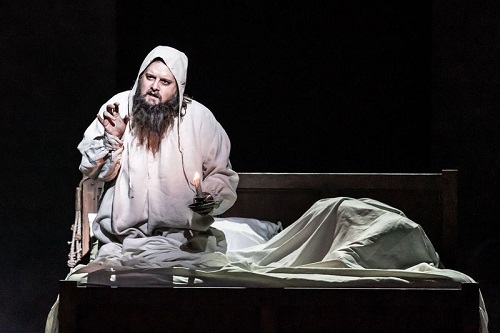
Allan Clayton was equally convincing as fundamentalist judge, military conqueror and anguished father. Though his flaws and fears were equally evident, this isn’t a sympathetic Jephtha: his piety seems riven by an almost violent puritanism. He makes his vow when tormented by dreams, standing on his bed, his wife Storgè asleep beside him, then self-flagellates, drawing the blood with which to write down his prideful promise. Eventually, even the people he has led to freedom turn against him, condemning him to solitary confinement, a lonely suffering which is deepened by his growing blindness. Clayton, physically and vocally, has the majesty for the role, and the emotional range, even if there was little Handelian about the style. The extreme anguish of ‘Open thy marble jaws, O tomb’ was, as the religious tablets pressed upon him, just as believable as the faith-driven gentleness of ‘Waft her angels, through the skies’.
Both Alice Coote as his long-suffering wife, and Brindley Sherratt as his stern brother, Zebul, sounded a little out of sorts at the start, but were more vocally assured subsequently, Sherratt finding his dark, booming suavity in the later acts. ‘Scenes of horror, scenes of woe’ may have unleashed grotesque, hellish figures to torment Storgè, but it didn’t convince musically; however, ‘Let other creatures die’ was a heartfelt, touching expression of a mother’s love for her daughter.
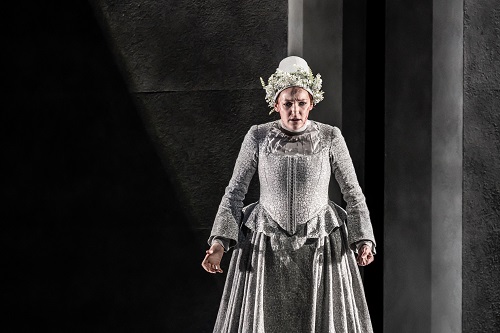
As Iphis, Jennifer France has to endure multiple disrobings, her grey plaid exchanged for a lighter wedding gown, before she is dressed for death, and finally attired in nun’s habit and wimple. The soprano captured the purity of spirit of Iphis, singing with sincerity and strength when urging her beloved Hamor to prove himself in battle beside Jephtha (‘Take the heart you fondly gave’), and beautiful lightness and clarity in ‘Tune the soft melodious lute’ and ‘Welcome as the cheerful light’, as the newly betrothed young girl prepares to meet and congratulate her victorious father.
She and countertenor Cameron Shahbazi blended sweetly as they reflected on a future of freedom and togetherness in their blissful duet, ‘These labours past, how happy we!’, and Shahbazi communicated the unfortunate Hamor’s dilemmas and resilience, as he wins his love through bravery and faithfulness then loses her to zealotry and stubbornness. Theirs was the most idiomatic baroque singing of the evening. However, it was unclear why, returned from the battlefield where he has proved his honour, he sang his tidings of great joy to Iphis – “Sought I thee, my glorious prize./ And now, happy in the blessing,/ Thee, my sweetest joy possessing” – in a distressed state, writhing on the floor with his hands dripping with blood.
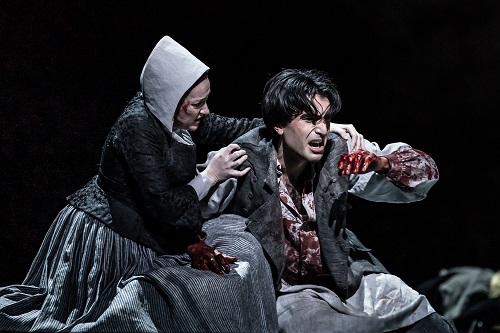
There are many powerful moments in this production, though, not least the substantial central quintet in which Storgè, Iphis, Hamor, Zebul plead with Jephtha to draw back from his vow. Clayton made Jephtha’s intransience seem as immovable as those huge tablets that framed the action. And, there’s a coup de théâtre when, as the puritans put their burning torches to the pyre – which is built from the benches upon which they sit to worship – divine intervention, in the form not of an Angel, but Jephtha’s young son, extinguishes the flames and reminds Jephtha that his vow allows him to devote his daughter’s life to the service of the Lord. Young treble Ivo Clark sang the air, ‘Happy, Iphis shalt thou live’ with lovely brightness, confidence and good projection.
Mears’ directorial revision of the ending is problematic, however. Iphis has been happy to accept her fate, fuelled by the love for her father and her faith, which France so beautifully expressed in ‘Farewell, ye limpid springs and floods’. Yet when the ‘Angel’ reminds Jephtha that he has forgotten the ‘get out clause’ (it would have made the opera two hours shorter if he had remembered!) and that they don’t have to burn Iphis in sacrifice after all, she suddenly looks utterly miserable about the prospect of becoming a nun and devoting herself to the God she was prepared to die for.
Then, having seeming resigned to her ‘new’ fate (‘All that is in Hamor mine’) – a decision which Hamor accepts in their duet, ‘Freely I to Heav’n resign’ – as all celebrate in joy, Iphis rips off her wimple and habit, and she and Hamor depart for the hills. The final chorus is sung from the aisles – are we supposed to be part of the puritanical congregation? – with Cummings guiding his ranks of singers with his back to the band, which upsets the ensemble even more. They tear up their vows as reams of paper flutter down upon the audience. It’s a strong theatrical gesture, but it weakens rather than strengthens the emotional intensity. Moreover, as Handel scholar Ellen T. Harris has remarked, the oratorio’s theme is one of acceptance, Handel’s own struggle with blindness lending an added autobiographical significance.
Claire Seymour
Jephtha – Allan Clayton, Iphis – Jennifer France, Storgè – Alice Coote, Hamor – Cameron Shahbazi, Zebul – Brindley Sherratt, Angel – Ivo Clark; Director – Oliver Mears, Set designer – Simon Lima Holdsworth, Costume designer – Ilona Karas, Lighting designer – Fabiano Piccioni, Movement director – Anna Morrissey, Royal Opera Chorus, Orchestra of the Royal Opera House.
Royal Opera House, Covent Garden, London; Sunday 12th November 2023.
ABOVE: Brindley Sherratt (Zebul). Allan Clayton (Jephtha) and Cameron Shahbazi (Hamor) © Marc Brenner